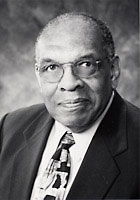On this date in 1928, Alton Lemon, who would go on to win a major state/church victory before the U.S. Supreme Court, was born in McDonough, Ga. He grew up in Atlanta. As a youth, he played on the same basketball team as Martin Luther King Jr. He obtained a bachelor’s degree in mathematics from Morehouse College in 1950. He was an aerospace engineer for the Naval Air Development Center in Pennsylvania, and an automotive design engineer at the Aberdeen Proving Ground in Aberdeen, Md.
Lemon also worked as an Equal Opportunity Officer for the U.S. Department of Energy. He was a citizen participation adviser for the U.S. Department of Housing and Urban Development, and he was at one time the program director for the North City Congress Police-Community Relations Program in Philadelphia. He also served in the U.S. Army and saw duty in the Korean War.
He served both as president and vice president of the Philadelphia Ethical Society, on the board of the Parents Union for Public Schools and was an active participant in the American Civil Liberties Union. He was married to Augusta Lemon for over 50 years.
Lemon was an “honorary officer” of the Freedom From Religion Foundation, a position reserved for freethinkers who have won Supreme Court cases in favor of the separation of church and state. He received a Hero of the First Amendment Award at the 2003 FFRF convention (although health problems at the last minute prevented him from accepting it in person).
He won the case Lemon v. Kurtzman (1971), which successfully challenged a Pennsylvania law, the first such law in the nation providing public tax funds to religious schools for teaching four secular subjects. As a member of the ACLU, he volunteered to challenge the law, which resulted in a decision that is a watershed for the Establishment Clause, and which historic decision bears his name. The Supreme Court unanimously invalidated the parochial aid.
In one of the enduring legacies of the Burger Court, it also codified existing precedent on the Establishment Clause into a test called the Lemon Test. This was not new law, per se, but a kind of noble attempt to clarify and make the Establishment Clause idiot-proof. The Lemon Test has been invoked in virtually every lawsuit FFRF has ever taken. Despite attacks against it and attempts to modify and chip away at it, the Lemon Test endures. It is our best friend. (D. 2013)


